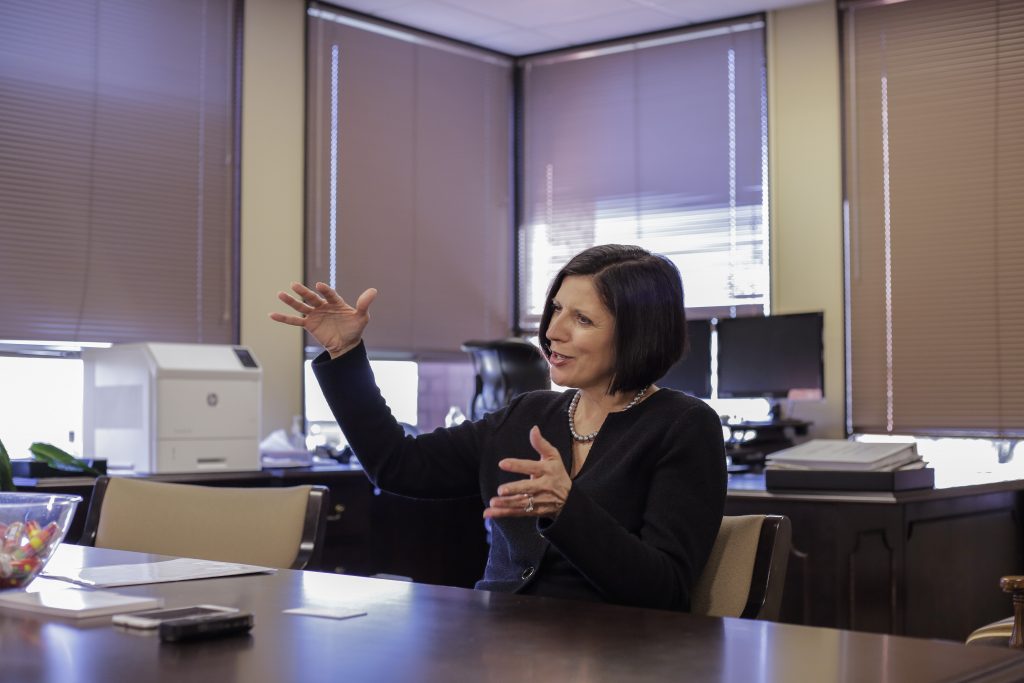Brookdale Senior Living (NYSE: BKD) is continuing to make headway with its real estate investment trust (REIT) partners as it shrinks its portfolio and re-balances from leased properties toward owned assets.
Brentwood, Tennessee-based Brookdale is the nation’s largest senior housing company, with a total portfolio of about 1,010 communities. The goal is to reduce that number at least 20% by 2020 or 2021, CEO Cindy Baier said on Tuesday at the Jefferies 2018 Global Healthcare Conference in New York City.
That goal is not because there’s a “magic number of communities to operate,” but is based on the number of communities that Brookdale is interested in walking away from, she said. The company wants to shed certain underperforming or non-strategic assets. Brookdale is also planning to dispose of some profitable communities to take advantage of high cap rates that they can command, in the interest of unlocking value for shareholders.
Through these portfolio optimization efforts, Brookdale wants to increase its proportion of owned real estate, Baier said, re-emphasizing a point she made three months ago when she first took the CEO position. Her appointment came at the conclusion of a strategic review process for Brookdale, which has encountered a number of challenges since its mega-merger with Emeritus Corp. in 2014.
In order to achieve its aims, Brookdale has had to work out agreements with its REIT landlords. One of these is Irvine, California-based HCP Inc. (NYSE: HCP), which on Tuesday shared an update on a variety of previously announced deals and initiatives related to its Brookdale holdings.
HCP has closed on its remaining investment in RIDEA joint venture that owned 49 communities, 46 of which were managed by Brookdale. Columbia Pacific Advisors was the buyer, and the disposition generated $332 million in proceeds for HCP.
In addition, HCP agreed to sell or transition 68 Brookdale communities through a November 2017 agreement. HCP has entered into a definitive agreement to sell 22 Brookdale communities to an institutional investor for $428 million, and this deal is expected to close in the third quarter of this year. The REIT is planning to transition 24 Brookdale-operated communities to Louisville-based Atria Senior Living, and 18 had transitioned as of June 4. For the remaining 21 Brookdale-managed communities, HCP is finalizing agreements to transfer them to new operators or market them for sale, and all these transitions and sales are expected to be completed this year.
In a separate agreement, HCP agreed to sell or transition an additional 25 Brookdale communities. Of these, five have been sold for $32 million, and 15 are under contract through three separate transactions totaling $98 million. The remaining five should be sold or transitioned in 2018.
The arrangements with HCP, as well as a recent master lease agreement with Chicago-based Ventas Inc. (NYSE: VTR), are examples of how Brookdale and its REITs are creating “win-win” strategies, Baier said.
For example, HCP has been able to achieve its goal of reducing its Brookdale concentration, while generating proceeds to strengthen its balance sheet.
“We’re working with our REIT partners and trying to find additional flexibility around communities we’re managing, and with our JV partners so that we can manage the whole portfolio similarly whether owned, leased or managed,” Baier said.
These negotiations are ongoing, and all options are on the table as Brookdale seeks to restructure its leases, including buying assets, making lease termination payments, or funding more capital expenditures.
“Given that our leased portfolio is losing money, [this] is one of the most important things we’re dealing with,” Baier said.
Once agreements have been reached with the REITs, Brookdale will be more forthcoming about how it might deploy the capital it raises through dispositions, she added. But more CapEx could be in the cards to renovate properties and drive occupancy. One major goal is to re-capture about 500 basis points of lost occupancy, which translates to around $125 million in annual cash flow with the portfolio at its current size.
That occupancy rebound will not be achieved overnight, Baier emphasized, but she said she is optimistic on progress made so far. In addition to the work done with the REITs, Brookdale’s strategy of “winning locally” appears to be bearing some fruit in the form of better employee retention and fewer preventable move-outs of residents.
The new local focus involves executive directors being given more authority to run their communities, including with regard to discounting rents, Baier explained.
Once the portfolio is more streamlined and senior housing supply/demand are more in balance than they are currently, Brookdale should be in a better place and could even start to grow again, but that might not be until 2020 or 2021.
“Turning a company around the size of ours doesn’t happen in a moment,” Baier said.
Written by Tim Mullaney
Companies featured in this article:
Atria Senior Living, Brookdale Senior Living, Columbia Pacific Advisors, HCP, Jefferies, Ventas


